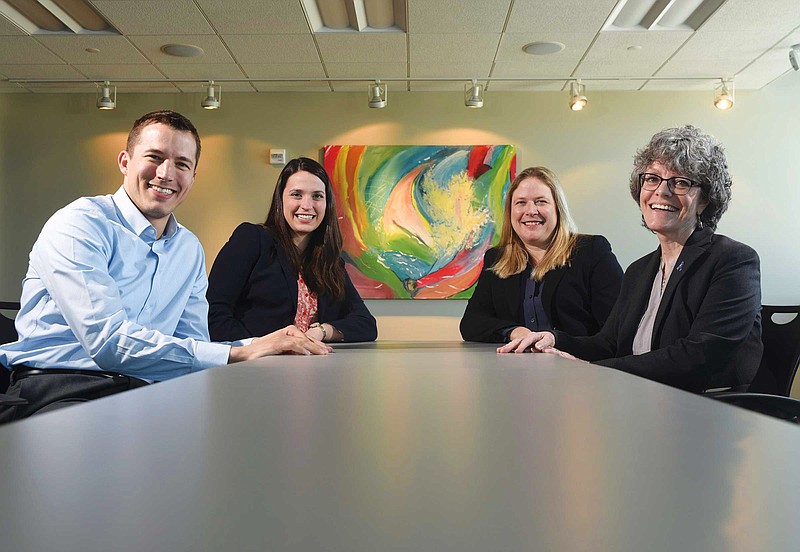Law careers by the numbers
* Median annual pay for attorneys in the United States: $115,820* Median annual pay for attorneys in Tennessee: $105,900* Median hourly wage for attorneys in Tennessee: $50.91* Number of jobs nationally: 778,700* Number of jobs in Tennessee: 7,990* Predicted total growth for jobs nationally: 6 percent (through 2024)* Predicted total growth for jobs in Tennessee: 9 percent (through 2024)Source: U.S. Department of Labor Statistics
When attorney Justin Furrow was interning at the Chattanooga law firm Chambliss, Bahner & Stophel during law school summers, his father asked him a simple question: "How do you like it?"
Furrow's answer was unhesitating.
Not only would he accept a full-time job if offered, Furrow told his father, he would gladly spend his entire career at the firm and accept the gold watch at retirement.
Youthful exuberance? Hyperbole?
Now, about a decade later, Furrow says his opinion about being rooted at Chattanooga's second-biggest law firm has n0t changed.
"When we were looking at firms, we focused on the people we would want to be around day after day," Furrow says. "We have great people here. We know each other's spouses, kids."
The Great Recession disrupted the legal profession's business model, experts acknowledge, making good jobs more precious. The New York Times reported last summer, "the proportion of recent (law school) graduates who find work as a lawyer is down 10 percentage points since its peak of the last decade."
Some law school graduates emerge with $100,000 to $200,000 in school debt and uncertain job prospects. Meanwhile, the Times reports that about 20 percent of American Bar Association-accredited law schools have trimmed faculty in recent years to reflect the leaner job market.
The down-sizing cycle was a residual of Great Recession when corporate America trimmed in-house counsel and demanded more efficiency from the law firms it retained. In the meantime, those law firms benefited from a bottleneck of talented young attorneys-in-waiting who were looking for jobs.
There are signs the market has turned. The U.S. Bureau of Labor Statistics predicts that the demand for young lawyers will increase by 6 percent by 2024, adding 43,800 new attorney positions in the decade between 2014-to-2024.
However, "competition for jobs should continue to be strong," the government reports, "because more students graduate from law school each year than there are jobs available."
Furrow now serves on the recruitment committee at Chambliss, Bahner & Stophel, which has 60 attorneys at its Chestnut Street offices. He says the talent pool of young lawyers is so rich at the moment that his firm has passed on job candidates with top grades from prestigious schools. Donna Burns, the firm's human resources director, says turnover is low at Chambliss, with an occasional departure or organic growth accounting for most of the recruiting.
One day last month, Farrow and two of the firm's newer attorneys, Cathy Dorvil and Catie Karczmarczyk, gathered in conference room on the 17th Floor of the Liberty Building on Chestnut Street, which offers a panoramic view of the city and a curated art collection. The three all came to the firm from different paths. Farrow was a former law school intern who was offered a job; Dorvil was an established attorney in Miami who came in a lateral move; and Karczmarczyk was two years out of law school who was recruited to Chattanooga through a head-hunting firm.
Karczmarczyk, who has been at the Chambliss firm just six weeks, came here from a firm in Abingdon, Virginia. She attended law school at George Washington University in from 2011-2014. During those years, Karczmarczyk says she and her peers were so focused on the task at hand - succeeding in law school - that they didn't think to much about what was ahead in the work world.
She said a head-hunting firm helped match her to the job in Chattanooga, and she was won over by the Chambliss firm's "sophisticated clients and high level work." Her work here will focus on labor and employment law. The city's emerging outdoors culture didn't hurt with her recruiting, Karczmarczk said. "The city is a great place for outdoor sports," she noted.
Dorvil said she graduated from law school just as the Great Recession was squeezing the economy, but she was fortunate and landed a job at a big firm upon graduation from the University of Miami Law School. Because of the strained economy, Dorvil says that beginning in the late 2000s law firm clients demanded better services at reduced rates.
"It went from being a market where the law firms dominated to a market where the clients dominated," she says.. "They (the clients) demanded better rates, better services." Meanwhile, the overall volume of legal work was relatively static, she said.
Here in Chattanooga, the Chambliss firm - although somewhat smaller now that at its peak - continued to serve its long-time clients while reaching out to the city's fledgling start-up business culture. Start-ups, after all, need high-quality legal expertise, and law firms need new clients.
Matching that start-up energy is a class of attorneys that Furrow calls affectionately, "our baby lawyers." Most of these are recruited through the firm's summer program which pulls from regional law schools such at the University of Tennessee, the University of Georgia and the University of North Carolina. Client referrals are also part of the mix, he said.
While the firm used to be represented at job fairs, teleconferencing with Skpe has been a time saver, Furrow said. Students chosen for the summer program typically serve a six-week summer session here after their first year in law school, and may be invited back for a second summer. The best-of-the-best may be offered positions with the firm.
Meanwhile, the firm soldiers on through the business cycle; counting on innovation and a close-knit culture to be its evergreen virtues.
